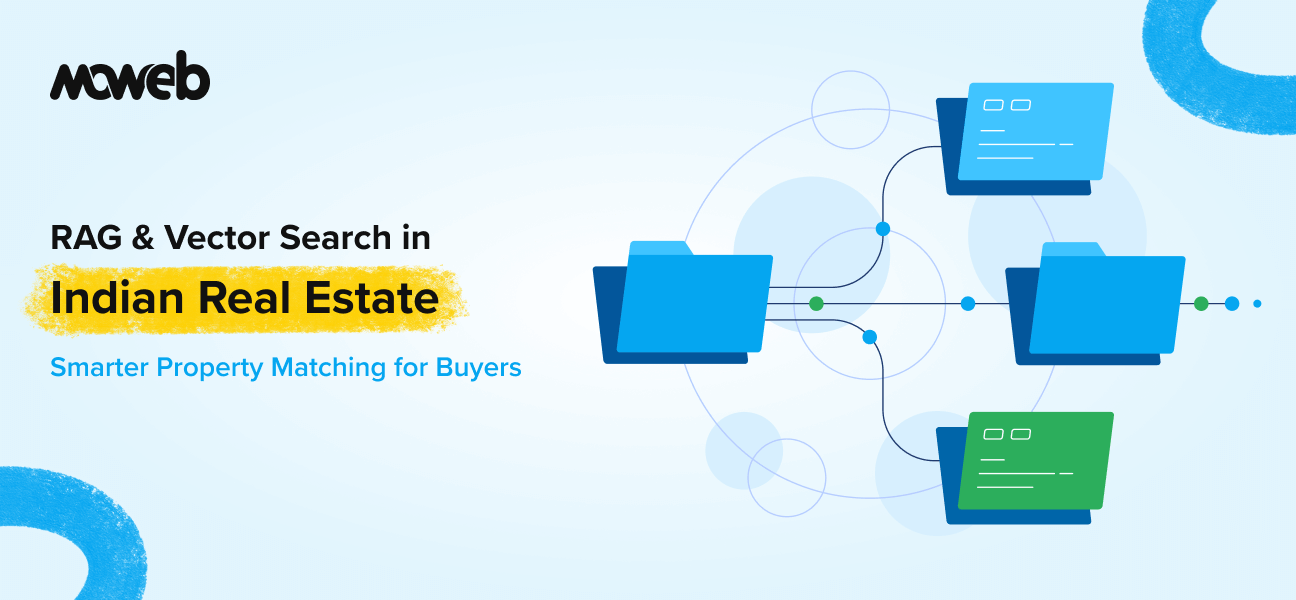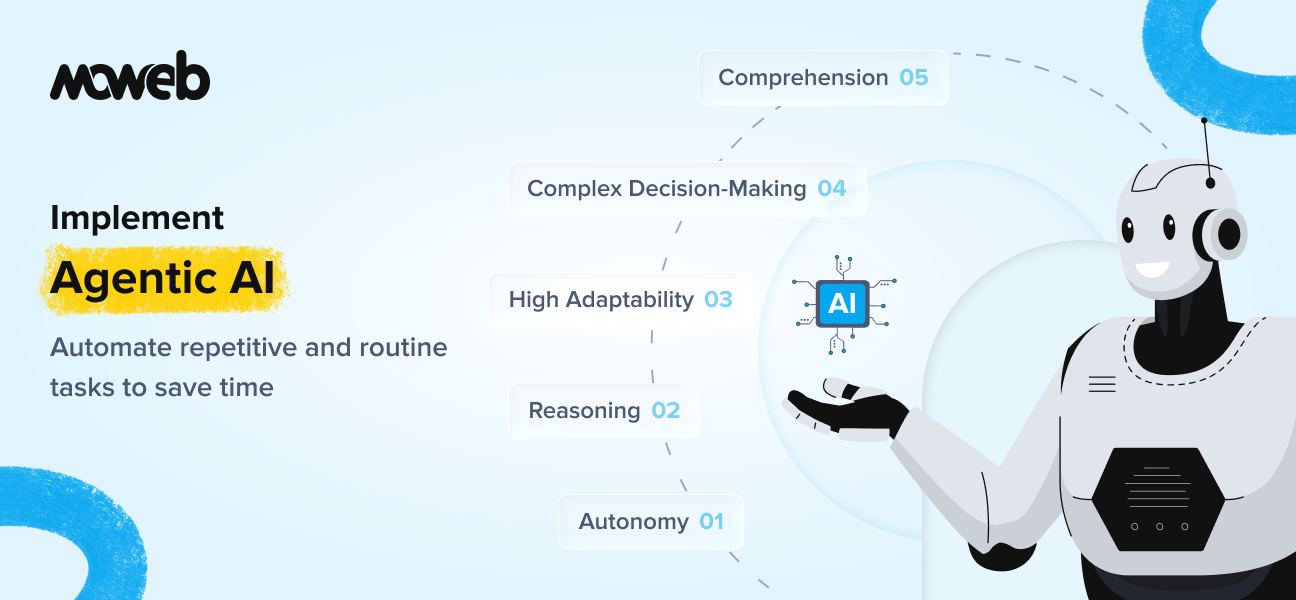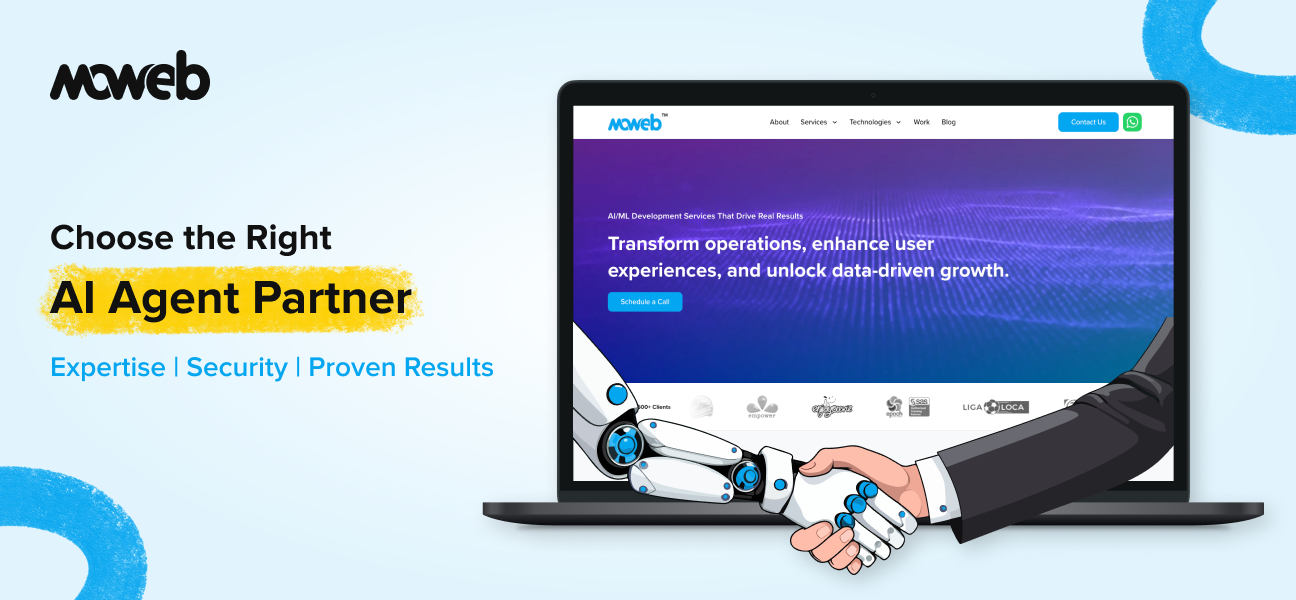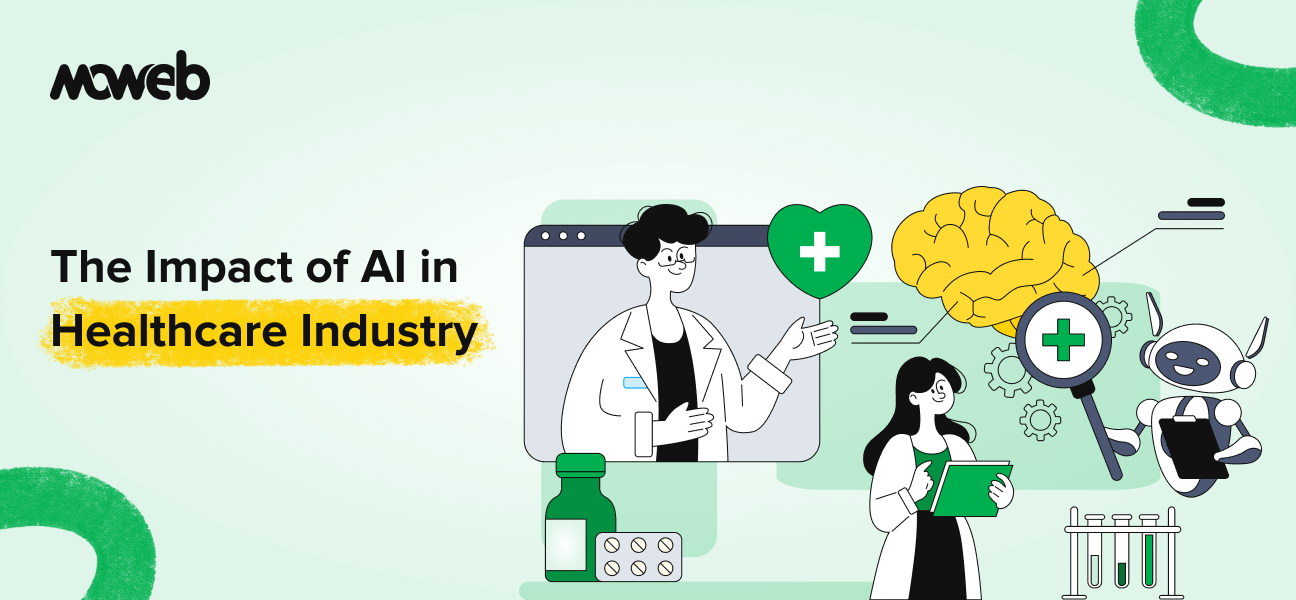
In the quiet corridors of hospitals and amidst the complex charts of medical researchers, a revolution is unfolding. It’s not loud. It’s not cinematic. But it’s real and it’s intelligent. It’s Artificial Intelligence. AI in healthcare is no longer a concept reserved for whitepapers or distant futures. It’s here, working alongside physicians, inside hospital systems, and behind diagnostic screens.
Imagine a world where AI medical diagnosis detects breast cancer on a quick scan, often with higher accuracy. This isn’t science fiction. It’s the emerging face of modern medicine. As healthcare systems globally struggle with rising patient loads and the pressing demand for precision, intelligent technology in healthcare steps in.
So why now? Because healthcare needs it urgently. It needs speed without compromise. It needs personalization that goes beyond guesswork. Most of all, it needs support. The kind that only intelligent systems in medicine can provide.
The New Era in Healthcare
Despite all the progress, the healthcare industry still struggles with delayed diagnostics, burned-out professionals, overwhelming paperwork, and rising costs. These aren’t just operational challenges. They impact lives.
Enter artificial intelligence in the medical field. Not to replace doctors, but to extend their capabilities. AI doesn’t sleep. It doesn’t guess. It doesn’t forget. When used thoughtfully, it enhances everything.
This blog explores how AI development services are reshaping healthcare – from diagnosis rooms to surgical theatres.
Understanding the Role of Intelligent Technologies in Healthcare
The fundamental definition of artificial intelligence in healthcare describes technologies that duplicate human intellectual capabilities. AI operates differently from traditional software because it learns from data and adapts operations while making logical decisions.
Three major subfields lead the transformation:
- Machine Learning in Healthcare: Detects trends, abnormalities, and makes predictions based on patient data.
- Natural Language Processing (NLP): Extracts valuable insights from unstructured content like doctor notes or discharge summaries.
- Computer Vision: Analyzes medical images and spots issues that a human eye might miss.
These tools transform with each interaction because they provide real-time cognitive support, which enhances human medical expertise.
Ready to Explore How AI Can Transform Your Healthcare Practice?
Discover AI Solutions TodayHow AI in Healthcare is Being Used Today
We often hear about AI’s promise in healthcare. But the truth is, it’s no longer just a promise. It’s practice. In hospitals, clinics, and even on smartphones, artificial intelligence in medical diagnosis is already playing a quiet but powerful role. The beauty lies in how seamlessly it’s woven into the existing systems. Maybe not clearly visible at times, but always impactful. The impact of AI in healthcare is significant, and its potential is vast.
Let’s look at areas where AI is not only being used but also making a real difference in people’s lives.
1. Reimagining Medical Imaging and Diagnostics
Imagine a radiologist sifting through hundreds of chest scans on a busy shift, while decisions are awaited on an urgent basis. What if an AI system reviews the same scans, highlighting suspicious spots, ranking risk levels, and flagging what a tired human eye might miss? That’s not future tech. That’s today.
Medical Innovation AI is helping reduce diagnostic errors, especially in time-sensitive health conditions like strokes or cancers. It doesn’t replace the doctor. It works like a sharp second opinion, one that’s fast, focused, and never fatigued.
2. Building Truly Personalized Treatment Plans
Every patient is different in terms of health condition and cure. But for years, treatments were often prescribed based on averages. Artificial Intelligence aids in a mindset shift. By analyzing a person’s medical history, genetic data, current symptoms, and even lifestyle patterns, AI in healthcare can help craft treatment plans that aren’t just standard but very specific.
We’re talking about therapies adjusted to how a patient’s body might respond, not how the average patient might. This isn’t just efficiency; this is empathy, powered by intelligence.
3. Accelerating Drug Discovery and Clinical Research
The traditional drug discovery process is long, expensive, and full of dead ends. But generative AI in healthcare is changing that. It’s changing in identifying how new compounds might react in the body, helping scientists narrow down promising candidates before they even reach a lab’s waiting bench.
It’s not just speeding up discovery. It’s saving resources, reducing human testing risks, and opening doors to treatments that would’ve taken a decade to develop. In a world where time can mean life or death, this shift is monumental.
4. Making Healthcare Conversations Continuous
People often feel lost, confused and what not once they leave a doctor’s office. Questions pop up. Medications get forgotten. Symptoms shift. That’s where virtual health assistants and AI-powered chatbots come in. Not just to overwhelm or automate care, but to support through digital health solutions between appointments.
They can send reminders, explain prescriptions in simple language, or flag concerning patterns in symptoms. For many, this kind of ongoing, low-pressure support can feel like a safety net.
5. Predicting What’s Coming Before It Arrives
What if we could catch a crisis before it became one? That is the promise of predictive analytics in healthcare, and AI is making it real. By analyzing patients’ various data, such as vitals, lab results, and past trends, AI systems can flag signs of deterioration before they become visible.
This doesn’t just save hospital costs; It saves lives. Nurses and doctors get alerted early, interventions start sooner, and patients avoid complications that would’ve otherwise gone unnoticed.
6. Assisting Surgeons, Not Replacing Them
AI in the operating room might sound cold and non-human, but its role is actually quite supportive. In robot-assisted surgeries, AI systems guide tools with a level of precision no human hand can match. But it’s still the surgeon who makes the call, who adjusts mid-surgery, who holds the responsibility.
The outcome? Smaller incisions. Quicker recoveries. Fewer complications. In some cases, it’s the difference between a three-day stay and going home the next morning.
We often think of innovation as something flashy, something loud. But the real impact of AI in healthcare is quieter, more personal. It shows up when a mother gets an early diagnosis that saves her life. When a rural patient chats with a bot at midnight and realizes it’s time to seek help. When a doctor finds the time to focus, because the paperwork took care of itself.
It’s not just about automation. It’s about attention. And that’s what makes it human.


Reimagine Healthcare with AI That Thinks Ahead
Partner with a leading AI-ML Development Company, where innovation meets impact.
Benefits of Integrating AI in Healthcare
The impact of AI in the healthcare industry is not limited to medical machines showcasing charts and multiple numbers or robots performing surgeries. It’s about moments that matter: a more precise diagnosis, a faster discharge, and a nurse who finally has time to listen. At its best, AI supports the people behind the care and the people receiving it.
Let’s look at what that truly feels like, on the ground.
1. Diagnostic Accuracy That Builds Confidence
No one wants to hear the words, “We missed it.” That’s where AI earns its place.
AI reduces the risk of oversight by analyzing scans, test results, and symptom patterns with more consistency than even the sharpest human eye. It doesn’t just spot the obvious. It catches the subtle. And when it works in sync with a physician’s expertise, patients get faster and more precise diagnoses. That clarity? It eases anxiety. It opens the door to timely treatment. It can, quite literally, save lives.
2. Hospital Efficiency That Patients Can Feel
Waiting in long queues. Delays in reports. Staff are running behind schedule. We’ve all been there.
With AI at your disposal, patient flow management becomes smooth, records are organized, and time isn’t lost to avoidable backlogs. When AI takes care of scheduling, paperwork, and even resource distribution, hospitals start to resemble care centers rather than disorganized complexes. As a result, the atmosphere feels more relaxed, concentrated, and, most importantly, patient-ready.
3. A Safety Net That Catches Human Error
Healthcare is high-stakes. And humans, no matter how skilled, are human.
AI acts like a second pair of eyes. Always watching, always alert. It catches mismatched drug dosages, flags missing test data, and alerts teams to potential conflicts in treatment. These checks aren’t there to replace judgment. They’re there to protect it. That quiet backup makes all the difference in an environment where even a small error can snowball.
4. Faster Help, and Happier Patients
When someone is unwell, time seems to drag, and uncertainty grows.
AI aids in bringing things on the fast track where it matters the most. From digital check-ins that cut wait times to chatbots that answer questions in real time, patients are no longer stuck in silence between appointments. They feel seen, supported, and engaged. That responsiveness doesn’t just improve satisfaction. It fosters trust.
And in healthcare, trust is everything.
5. Giving Healthcare Workers Their Time Back
Behind every diagnosis and treatment plan is a tired doctor, an overworked nurse, or an engulfed administrator.
AI steps in to lighten the load. Not by taking over, but by handling the tasks that don’t require human intervention. It manages the tedious tasks, updates documentation, and expedites follow-ups. What does that mean for medical teams? More time with patients. More focus during emergencies. And maybe, just maybe, a breather between shifts.
This isn’t just about performance. It’s about preserving the people who make healthcare work.
AI in healthcare is more than just automation and algorithms. Care must be redesigned with the needs of the recipients and the providers in mind. It does more than merely enhance systems when applied thoughtfully and sympathetically. It makes experiences better.
And that’s the real definition of progress.
Related Post: How AI Is Transforming Supply Chain Management
Challenges in AI Integration
Bringing AI into healthcare isn’t just about upgrading technology. It’s about fitting intelligent systems into a space that deals with people at their most vulnerable. And that comes with challenges – some predictable, others quietly complex.
1. Safeguarding Patient Data
At the center of AI’s power in healthcare is data. Lab reports, diagnoses, genetic profiles, real-time vitals. But that power comes with a burden. Every piece of that data belongs to someone. A real person who has been trusting the system to keep it safe.
Healthcare providers already work under strict regulatory frameworks like HIPAA. But AI brings added complexity. The volume of information increases. So does the risk. A single breach will not be just a technical failure. It will be a breach of trust that’s hard to earn back.
Strong encryption, anonymization, and access control aren’t nice-to-haves. They’re essential. Especially when patient confidence is on the line.
2. The Price of Smart Systems
There’s no gentle way to say this: building effective AI solutions is expensive.
Especially in healthcare where minute detailing and precision matters. You can’t just use an off-the-shelf algorithm and hope it works. You need quality datasets, training, custom development, infrastructure, and constant maintenance.
Projects that use machine learning in healthcare can easily push beyond six figures. That makes adoption difficult for smaller clinics or rural hospitals with limited resources. It’s not about willingness – it’s about capacity. And until AI becomes more accessible financially, this remains a major hurdle.
3. Human Skepticism (And Why It’s Valid)
Technology often moves at a fast-pace. People may not be able to follow at the same pace – and in healthcare, that’s understandable.
Doctors and nurses already carry a lot of responsibility. When a tool appears that promises to ‘help’ or ‘speed things up,’ the reaction isn’t always positive. It can trigger concern, even resistance. What if the AI gets it wrong? What if decisions start being made by algorithms and not professionals?
To integrate AI in healthcare industry settings, the conversation has to shift. AI should be presented not as a replacement, but as a collaborator. One that extends human ability, not overrides it.
4. Biased Algorithms, Real Consequences
Bias in Artificial Intelligence isn’t just an academic issue. It’s a real-world problem with human impact.
If an algorithm is trained mostly on data from one type of population, it may underperform or misdiagnose. That could mean missed warning signs, flawed predictions, or recommendations that don’t apply.
And in a field like healthcare, that’s not just inconvenient. It’s dangerous.
Fairness and ethical AI in medicine require diverse training data, regular audits, and ethical review at every stage. Not just because it’s good practice – but because it’s the right thing to do.
5. Relying Too Much on the System
Automation has its appeal. It speeds things up. It reduces the workload. But overreliance comes with risk.
No AI system is perfect. It can misread data or fail in unfamiliar cases. If healthcare workers rely highly on automation – especially without reviewing or questioning the outputs – patients could be left vulnerable.
The goal is not to eliminate human oversight. It’s to strengthen it. AI is expected to support critical thinking, not replace it. That’s why the “human-in-the-loop” approach is so important in high-stakes environments like medicine.
6. Learning Curve and Training Gaps
Installing AI is easy. Getting people comfortable with it? That’s the real challenge.
Many tools are introduced without proper onboarding. Teams are told the system “just works” and are expected to adapt overnight. But healthcare doesn’t work like that. It’s layered. It’s personal. And change is hard when you’re already stretched thin.
Doctors, nurses, and support staff need training that fits their world—hands-on, intuitive, and respectful of their time. Because if the people using AI aren’t confident in it, even the smartest system will fall flat.
Key Technologies Powering AI in Healthcare
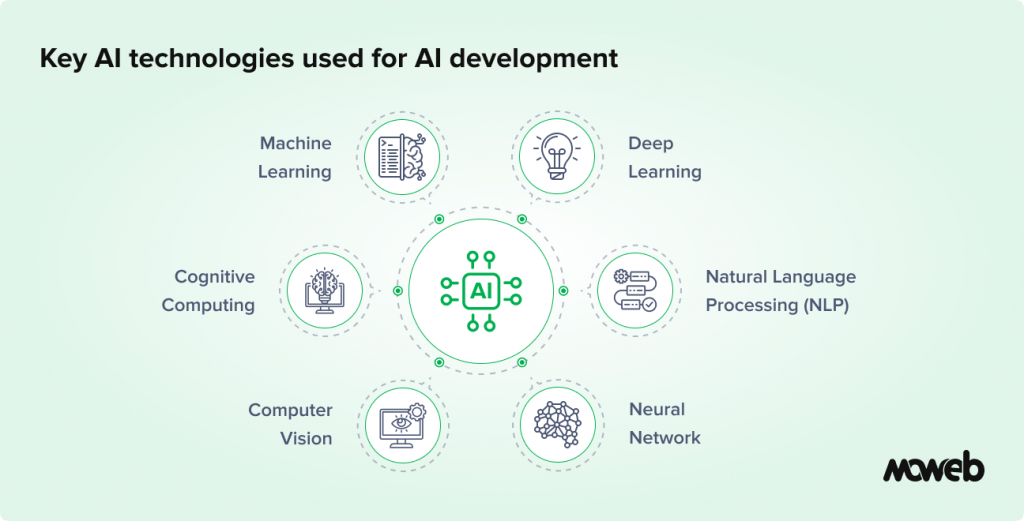
The backbone of AI in healthcare comprises several critical technologies. Together, they form the backbone of future-ready healthcare software development.
- Machine learning models: These algorithms learn patterns from data to make predictions or decisions, forming the core of many AI diagnostic and predictive tools.
- Computer vision: Essential for analyzing and interpreting medical images, enabling AI to identify abnormalities in scans and X-rays.
- NLP for medical records: Natural Language Processing extracts valuable insights from unstructured clinical notes, research papers, and patient narratives, facilitating better understanding and data utilization.
- IoT and Big Data integration: Internet of Things (IoT) devices, such as wearables, collect vast amounts of real-time health data. Big Data platforms are crucial for storing, processing, and analyzing this enormous influx of information to derive actionable insights.
The Future of AI in Healthcare
This future isn’t just smart. It is profoundly personal, data-driven, and patient-first.
- Smart Wearables for Earlier Detection
Wearable devices equipped with artificial intelligence are taking a step beyond simply tracking how many steps you take. Now they can also identify irregular heart rhythms, sleep disorders, and minute changes in your daily patterns, often before you have any symptoms. That type of early warning can reduce preventable health events. - Personalized Medicine through Genomics
AI in genomics is offering to help decode what makes each person biologically unique. Instead of therapies based on trial and error, however, doctors can start to look forward to data-driven personalized medicine, based on your genetic code. This minimizes risks, enhances outcomes, and achieves more accurate care. - AI in Telemedicine & Remote Care
In the upcoming iterations of telemedicine, AI will assist during real-time video consultations. While the doctors concentrate on the patient, AI can multitask by reviewing lab reports, suggesting possible diagnoses, and monitoring vitals in the background. This is particularly beneficial in rural and underserved areas with limited access to healthcare facilities. - Building Ethical AI in Healthcare
As more AI healthcare systems are implemented, we must ensure their trustworthiness by designing them with strong and robust ethical frameworks for AI usage. These are essential to ensure the systems are fair, explainable, and accountable. From data usage to decision-making processes, ethics must be woven into every line of code.
Conclusion
Artificial Intelligence in healthcare has the potential to greatly improve diagnosis by enhancing patient care and streamlining procedures. The benefits of AI in the medical domain are undeniable, and they range from revolutionizing drug discovery and therapy customization to increasing the accuracy of AI medical diagnosis.
It is advised that medical professionals integrate intelligent systems into their practices. Partnering with a healthcare-focused software development company ensures that these technologies are built with clinical precision, patient empathy, and regulatory compliance in mind. When tech experts and clinicians come together, innovation aligns with care.
From smart diagnostics to seamless digital care, Moweb empowers healthcare innovators to build ethical, future-ready solutions. Partner with us today!
FAQs
1. How is intelligent technology improving AI medical diagnosis today?
Now that we know that Artificial Intelligence is no longer a dream left in the pipeline. It is already helping doctors and medical researchers see what is often hard to catch with the human eye. AI systems are capable of analyzing medical scans and lab reports in seconds, accentuating even the smallest warning signs. With AI in healthcare, diagnosis becomes quicker, more accurate, and far more reassuring for both patients and caregivers.
2. How does artificial intelligence help streamline hospital operations and patient care?
Clearly, hospitals and care centres are busy places with attention-demanding patients right there on the bench. AI is quietly helping in the background. It is managing schedules, organizing medical records, and handling repetitive tasks that usually take up valuable time. This gives doctors, nurses, and administration more time to focus on patients instead of paperwork.
3. What is the typical cost of building an AI-based healthcare app?
A simple AI-powered app could start around $50,000. In comparison, something more advanced might go beyond $300,000. The more features and data integration you need, the higher the investment will be. Working with the right Enterprise Software Development Company ensures you’re not just building an app, but creating a strong, future-proof solution that’s worth every rupee.
4. What ethical challenges are involved with AI in healthcare business operations?
This is a big and crucial one. Artificial Intelligence can only be as fair as the data it’s trained on. If the data leaves out certain groups or doesn’t reflect real-world diversity, the algorithm outcomes can be biased. That’s not just a tech issue – it’s a human one. Following clear regulatory frameworks and focusing on ethical AI in medicine helps protect patient trust and ensures the technology serves everyone equally, not just a few.
5. Should I go for a custom Artificial Intelligence solution or a pre-built product?
That’s a tricky question; the answer often lies in your requirements. If your systems are complex or your team needs something specific, a custom solution is usually the better choice. Often, pre-built tools may get you started faster, but they do come with limitations. A custom approach gives you room to grow, adapt, and truly meet your goals.
6. How does smart healthcare technology help reduce treatment costs?
AI in healthcare not only brings huge technological differences but also aids in reducing treatment costs. It supports early detection, speeds up decisions, and avoids repeated tests or hospital visits. All of this adds up to significant cost savings. And when patients feel better faster, the value is even greater, both financially and emotionally.
7. How do AI-powered wearable devices connect with hospital systems?
Today’s smart looking wearable gadgets do more than just track steps. These wearables are capable of collecting health data like heart rate or oxygen levels and send it directly to hospital systems in real time. This allows doctors to stay informed and respond sooner if something seems off. For patients managing chronic conditions, this kind of constant connection can feel like a safety net they didn’t know they needed.
Found this post insightful? Don’t forget to share it with your network!



